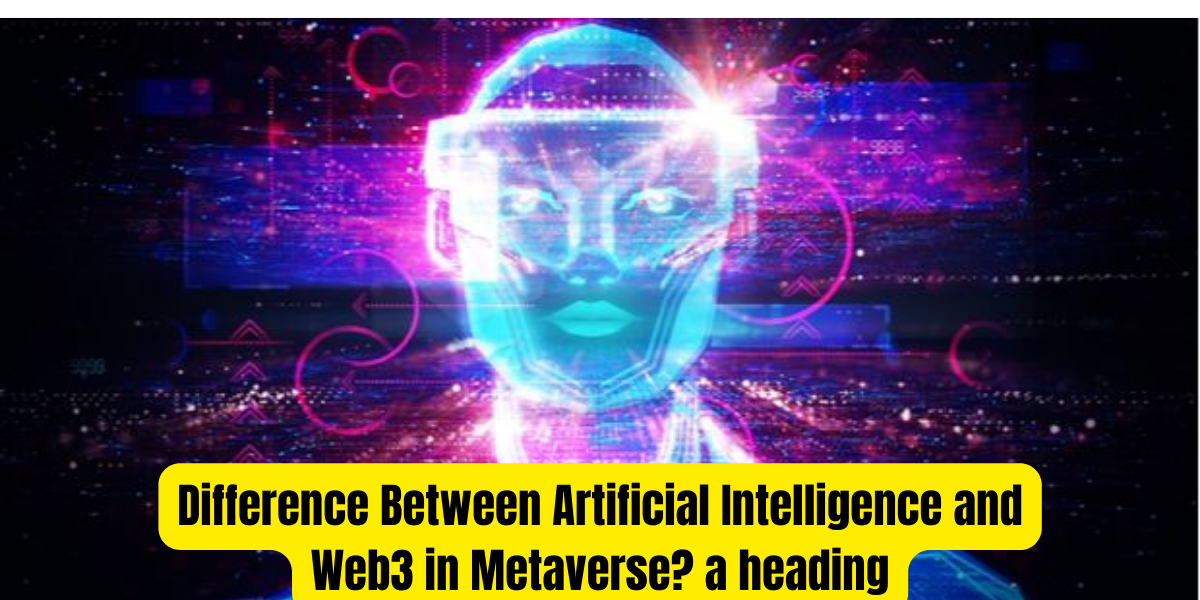What is the Difference Between Artificial Intelligence and Web3 in Metaverse?
the rapidly evolving landscape of technology, two terms that have been gaining significant attention are artificial intelligence (AI) and Web 3. Both AI and Web3 play crucial roles in the development and functioning of the metaverse, but they serve different purposes and have distinct characteristics. In this article, we will delve into the nuances that set these two concepts apart and explore their contributions to the metaverse.
Understanding Artificial Intelligence (AI)
Artificial intelligence, often abbreviated as AI, refers to the simulation of human intelligence in machines that are programmed to think and learn like humans. It encompasses a wide range of technologies and applications, including machine learning, natural language processing, and computer vision. In the context of the metaverse, AI plays a pivotal role in creating immersive and interactive experiences for users.
AI in the Metaverse
Virtual Assistants: AI-powered virtual assistants are a common sight in the metaverse. These intelligent entities assist users in navigating the virtual world, answering queries, and providing real-time information.
Content Creation: AI algorithms are used to generate content such as virtual landscapes, characters, and objects, making the metaverse visually appealing and dynamic.
Personalization: AI algorithms analyze user behavior and preferences to personalize the metaverse experience, suggesting relevant content and interactions
Security: AI-driven security systems protect users from threats and ensure a safe environment within the metaverse.
Exploring Web3 in the Metaverse
Web3, on the other hand, represents the third iteration of the internet. It is a decentralized and blockchain-based ecosystem that aims to redefine how we interact with digital assets, information, and identities. Web3 introduces transparency, trust, and ownership to the metaverse.
Web3 Applications in the Metaverse
Digital Ownership: Web3 enables users to have true ownership of digital assets, such as virtual real estate, virtual goods, and digital art. This ownership is secured through blockchain technology.
Decentralization: Unlike traditional web structures, Web3 relies on decentralized networks, reducing the control of centralized entities and fostering a more democratic internet.
Interoperability: Web3 fosters interoperability between different metaverse platforms and virtual worlds, allowing users to carry their digital assets across various environments seamlessly.
Smart Contracts: Web3 introduces smart contracts, self-executing agreements with the terms of the contract directly written into code. These contracts automate transactions within the metaverse.
Bridging the Gap
While AI and Web3 serve different functions in the metaverse, they are not mutually exclusive. In fact, they complement each other in several ways:
AI-Powered Web3: AI can enhance the functionality of Web3 applications by providing personalized experiences and improving security.
Data Analysis: AI can analyze the vast amount of data generated within the metaverse, providing valuable insights for Web3 projects and applications.
Virtual Economies: AI-driven simulations can contribute to the development of virtual economies within Web3, ensuring a realistic and engaging metaverse.
Both artificial intelligence and Web3 are integral components of the metaverse, each bringing its own unique set of capabilities and benefits. AI enhances user experiences and provides essential services, while Web3 revolutionizes ownership, decentralization, and trust. As the metaverse continues to evolve, the synergy between these technologies will likely shape the future of digital interaction.
How can artificial intelligence be used in the metaverse?
Artificial intelligence (AI) can be used in the metaverse in various ways. Here are a few examples:
Smart NPCs: Non-playable characters (NPCs) can be programmed with AI to make them more intelligent and responsive to player actions. This can enhance the realism of the metaverse and make it more engaging.
Personalized content: AI can be used to analyze player behavior and preferences to create personalized content such as quests, challenges, and rewards. This can improve player retention and satisfaction.
Real-time translation: AI-powered language translation can help players communicate with each other across language barriers, making the metaverse more inclusive and accessible.
Automated moderation: AI can be used to monitor player behavior and detect inappropriate or abusive behavior. This can help ensure a safe and welcoming environment for all players.
As for the difference between artificial intelligence and Web3 in the metaverse, they are two different concepts. Artificial intelligence refers to the ability of machines to perform tasks that would normally require human intelligence, such as learning, reasoning, and problem-solving. On the other hand, web3 refers to the next generation of the internet, which is decentralized, open-source, and community-driven. While both AI and Web3 can be used in the metaverse, they serve different purposes. AI can enhance the functionality and user experience of the metaverse, while Web3 can provide a more democratic and decentralized infrastructure for it.
What are the benefits of using Web3 in the metaverse?
Artificial intelligence (AI) and Web3 are two distinct concepts in the context of the metaverse.
AI refers to the simulation of human intelligence in machines that can perform tasks requiring human-like cognitive abilities. It involves the development of algorithms and models that enable machines to learn, reason, and make decisions. AI can be used in various applications within the metaverse, such as creating intelligent virtual characters, enhancing user experiences, and optimizing virtual worlds.
Now, let’s move on to the benefits of using Web3 in the metaverse:
Ownership and Control: Web3 allows users to have true ownership and control over their digital assets, identities, and interactions within the metaverse. This means that users can have more autonomy and freedom in how they engage with virtual worlds.
Interoperability: Web3 protocols are designed to be interoperable, meaning that users can seamlessly transfer digital assets and data between different virtual worlds and applications. This promotes a more connected and fluid metaverse experience.
Transparency: Web3 leverages blockchain technology, which provides transparent and tamper-proof records of transactions and interactions. This transparency can help build trust among users in the metaverse ecosystem.
Privacy and Security: Web3 protocols prioritize user privacy by enabling users to have control over their personal data. Additionally, the decentralized nature of Web3 makes it more resilient to security breaches and censorship.
Economic Opportunities: Web3 introduces new economic models within the metaverse by enabling peer-to-peer transactions, digital asset ownership, and decentralized marketplaces. This creates opportunities for users to monetize their creations and participate in the virtual economy.
How will the use of artificial intelligence and Web3 impact the development of the metaverse?
Artificial intelligence and Web3 are two technologies that are expected to have a significant impact on the development of the metaverse.
Artificial intelligence (AI) refers to the ability of machines to perform tasks that typically require human intelligence, such as visual perception, speech recognition, decision-making, and language translation. In the context of the metaverse, AI can be used to create more realistic and immersive virtual environments, as well as to enable more sophisticated interactions between users and virtual objects.
Web3, on the other hand, refers to the next generation of the internet, which is focused on decentralization, privacy, and user control. Web3 technologies such as blockchain and decentralized applications (dApps) are expected to play a significant role in the development of the metaverse by enabling secure and transparent transactions, as well as by facilitating the creation of decentralized autonomous organizations (DAOs) that can govern virtual worlds.
The use of AI and Web3 technologies in the metaverse is expected to have several impacts. Firstly, it will enable more realistic and immersive virtual environments that can be used for a wide range of applications, from gaming to education to business. Secondly, it will facilitate more sophisticated interactions between users and virtual objects, enabling users to have more control over their virtual experiences. Finally, it will enable new business models that are based on decentralized ownership and governance, which could lead to more equitable and sustainable virtual economies.
Overall, the use of AI and Web3 technologies in the metaverse is expected to have a transformative impact on the way we interact with virtual environments and with each other in these environments.
Frequently Asked Questions (FAQs)
1. Can AI and Web3 work together in the same metaverse?
Yes, AI and Web3 can coexist and collaborate within the same metaverse. AI can enhance the functionality and security of Web3 applications.
2. How does Web3 ensure digital ownership within the metaverse?
Web3 uses blockchain technology to record and verify ownership of digital assets, guaranteeing true ownership in the virtual world.
3. What are some examples of AI-powered applications in the metaverse?
AI-powered virtual assistants, content generation, personalization, and security systems are common examples of AI applications in the metaverse.
4. Is Web3 limited to the metaverse, or does it have applications outside of it?
Web3 has applications beyond the metaverse, including decentralized finance, supply chain management, and digital identity verification.
5. How will the synergy between AI and Web3 shape the future of the metaverse?
The collaboration between AI and Web3 is likely to create more immersive, secure, and personalized metaverse experiences, driving innovation in the digital realm.

